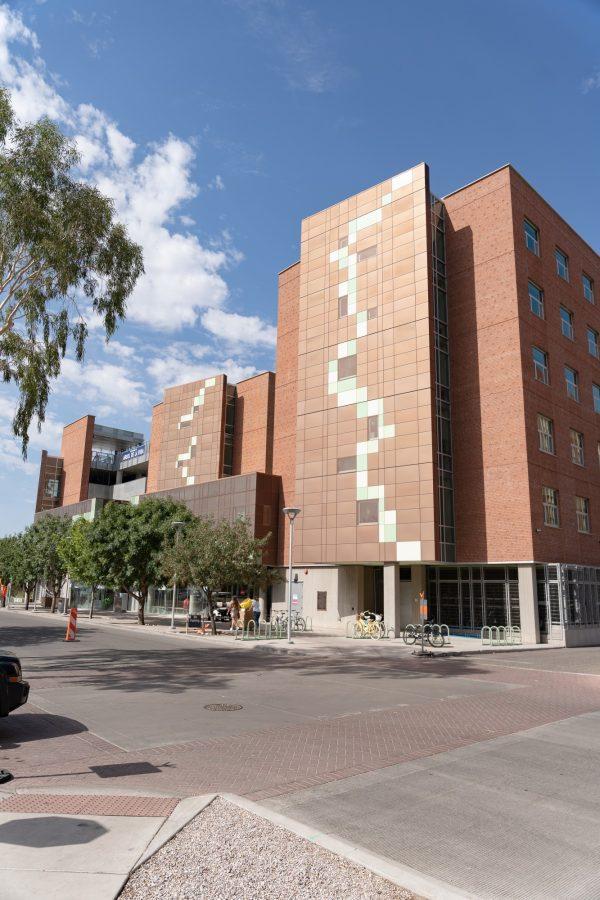RecycleMania, a contest hosted by the University of Arizona Housing and Residential Life spanning from Jan. 31 to March 26, aims to encourage recycling and other sustainable living practices among students.
RecycleMania is part of a larger national competition known as “Campus Race to Zero Waste,” and has been a practice at the UA since 2005.
Jill Burchell, Housing’s senior coordinator of Sustainability Operations and Initiatives, oversees RecycleMania every year and explained how the contest works. Each residence hall receives points for certain sustainable measures they take. These measures include recycling more than they did in the fall, attending programming about sustainability led by their Resident Assistants, or making TikTok videos.
“It’s not just the weight of the recycling, but also all this other sort of supplemental educational stuff. So we require all of our RA’S to do some sort of sustainability related bulletin board in either February or March. And so by the time February and March are done, they’ve all had a bulletin board up about sustainability, so that’s 250 bulletin boards. And so we try to get folks involved on multiple levels,” Burchell said.
Honors Village Residence Hall’s Resident Assistant Sejal Sampat detailed the different responsibilities managed by RA’s in the dorms during this contest.
“As RAs, our goal is to communicate the competition with our building and encourage our residents to participate in the challenge. My responsibility this year was to fill our bulletin boards with recycling rules, dos and don’ts, and other tips to keep students mindful and aware of their recycling habits,” Sampat said. “Our staff is encouraging residents through social media this year, by creating a short video to, once again, outline how to properly recycle and to encourage the building to participate in this challenge. Residents are encouraged to reach out to their RA if they want to get more involved or have any other questions about the challenge.”
Burchell mentioned that the student response to this program has been largely positive, with students channeling competitive spirits into sustainability.
“Every year there’ll be a few halls that just really get into it … it’s a lot of fun to see that, it really is,” Burchell said.
Sampat has seen a similar enthusiasm expressed by students during RecycleMania, and, as an RA and student, offers a unique perspective of student participation in the dorms.
“In my four years of living in the dorms, [RecycleMania] has always been an exciting challenge to be a part of. I think that competition between the dorms across campus gets residents motivated to participate and willing to learn more about keeping the earth clean,” Sampat said. “I have seen a more positive response to the challenge this year, as a lot of the residents in our building care about sustainability and the environment. I have also had some residents tell me they didn’t know certain things were not supposed to be recycled or that there’s a minimum size for recyclables, which tells me that this challenge is really important in educating our current and future generations on sustainable practices.”
RELATED: UA alumnus travels to space
In terms of educating students about materials that can and cannot be recycled, this year the program is placing an emphasis on the importance of quality over quantity. Contaminated recycling has emerged as an issue of concern not just on campus, but nationally as well. So, those in charge of the program have taken steps to prevent this contamination from occurring.
“We do a contamination check twice during the program, and they can earn bonus points if they have less than 10% contamination. And so we are trying to get folks thinking about clean recycling, that being the number one priority these days. If you don’t know if it’s recyclable or not, it is better to throw it away,” Burchell said. “Plastic bags, and items with food and liquids are our two biggest problems. You can’t have plastic bags in the recycling … even if it’s all perfectly clean recycling. Because it’s in a plastic bag, it’s contaminated,” Burchell said.
While this competition and promotion of sustainable practices only takes place over the span of two months, UA Housing and Residential Life makes it a priority to educate students about how to live more sustainably all year round. This is done through the implementation of a variety of different educational programs and initiatives.
“We have a big competition in the fall; that sort of anchors our fall education. And then we have [RecycleMania] in the spring, and then we have an environmental justice requirement. For all the halls, they have to hang at least one environmental justice bulletin board in April. It’s like a board on eco racism, eco sexism, you know, things like that, explaining those concepts,” Burchell said. “We also have an Eco-Rep program, which is a student group that gets together every couple of weeks and learns more about sustainability. And then they’re asked to take that information back to other people in their halls and share it … So we have a few layers in place of things to try and teach sustainability.”
RA’s implement these practices in their halls, and also encourage conversations with and among students about ways in which they can live more sustainably.
“At the Honors Village, we continue to encourage sustainable practices through signage around the building and dorm-wide programming. We want to make recycling accessible and easy for our residents,” Sampat said. “Earlier in the semester, we did a goal-setting program and one of the topics was centered around sustainability. We had several conversations with residents about how they can not only enhance their recycling habits, but also limit water and electricity usage in their rooms.”
RecycleMania ends March 26, and according to UA Housing and Residential Life, the dorms with the most points (based on recycling volume and quality) will be awarded with a $250 food incentive and $150 on food or something sustainable for the dorm for first place, a $250 food incentive for second place and a $250 food incentive for third place.
Follow Sam Parker on Twitter









